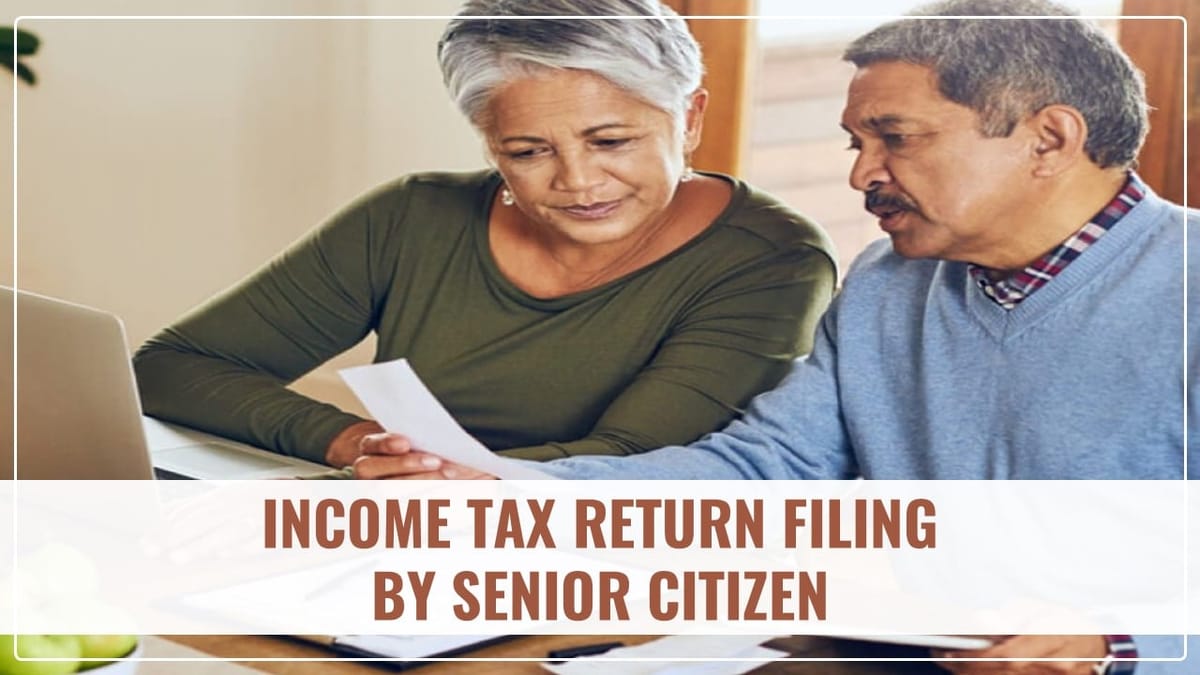The countdown to the July 31, 2024 deadline for filing ITR has begun. Senior citizens should initiate the process early to file an error-free return.
Reetu | Jun 8, 2024 |

ITR Filing: Income Tax Return Filing by Senior Citizens; Check Form 26AS, AIS and claim TDS Refund
The countdown to the July 31, 2024 deadline for filing income-tax returns (ITR) has begun. Senior citizens should initiate the process early to file an error-free return.
The basic exemption limit for senior citizens (60 to below 80) is Rs.3 lakh. The limit for super senior citizens (80 and beyond) is Rs.5 lakh. The basic exemption limit for those senior citizen taxpayers under the new tax regime (Section 115BAC of the Income-Tax Act, 1961) is Rs.3 lakh.
Senior citizens frequently fail to record incomes such as interest, commissions, or dividends on their ITRs. All income, regardless of the amount or tax deduction, must be reported. Failure to do so is considered under-reporting and may result in scrutiny and penalties from the tax department.
Many senior citizens fail to claim the appropriate tax deductions. Those who invest in the Senior Citizens Savings Scheme should claim the Section 80C deduction.
Section 80TTB allows deductions up to Rs.50,000 for interest income earned by resident senior citizens from bank accounts.
These deductions will be unavailable to those who choose the new tax regime.
Many seniors assume they do not have to file returns if tax is deducted at the source (TDS) on their income. This is wrong. The exemption under Section 194P applies only if the senior citizen is 75 or older, was a ‘resident’ in the previous year, has just pension and interest income, and has submitted a declaration to their bank.
It is the bank’s responsibility to deduct necessary taxes on senior citizens’ behalf, thus eliminating the need for them to file returns. Those who are qualified for a tax refund must file a return.
Many senior citizens are unsure whether Section 87A of the I-T Act, which provides a tax rebate to those with income below Rs.5 lakh (after deductions under Chapter VI-A), applies to them or not. It is applicable to all resident taxpayers, regardless of age or category, and is effective for the 2024-25 tax year, subject to new adjusted thresholds.
The amount of rebate is limited to the amount of income tax or Rs.12,500 (Rs.25,000 under the new tax regime), whichever is less.
If a senior citizen uses the new tax regime and their income does not exceed Rs.7 lakh, they can receive a rebate on their entire tax liability.
Section 16(IA) of the Income-tax Act allows for a standard deduction of up to Rs.50,000 on salary and pension income.
Senior citizen parents who get rent from their children (who claim House Rent Allowance) must report it on their ITRs. In addition to e-filing, super senior citizens can submit their ITR 1 or ITR 4 in offline/paper mode.
Before submitting their ITRs, senior citizens should check Forms 26AS and AIS for TDS deductions. If their income falls below the taxable limit, they should claim these deductions on their ITRs and get a refund.
Senior citizens should maintain proof of deductions and submit it to their banks if Section 194P applies.
ITR 1
If a senior or super senior citizen’s income includes a salary or pension, rental income, or other sources of income such as interest, etc.
ITR 2
In addition to the above-mentioned income, if they also have capital gains from the sale of shares, property or other assets.
ITR 3
If they earn income through a business or profession (excluding revenue subject to presumptive taxation).
ITR 4
If they have income from a business or profession that is taxed presumptively under sections 44AD, 44ADA, etc.
In case of any Doubt regarding Membership you can mail us at [email protected]
Join Studycafe's WhatsApp Group or Telegram Channel for Latest Updates on Government Job, Sarkari Naukri, Private Jobs, Income Tax, GST, Companies Act, Judgements and CA, CS, ICWA, and MUCH MORE!"